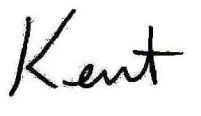How To Turn Your Values Into Actions
If you want to live your values, they must become actions.
Author Gary Smalley once wrote, “Life is relationships. The rest is just details.”
Think about it. Nearly every significant thing that happens in our lives—whether good or bad—involves a relationship.
That’s why five out of my twelve personal core values revolve around relationships.
Here’s one example:
Success – being respected most by those who know me best.
I borrowed this one from John Maxwell because I thought it was so good.
Now let me give you an example of what happens when our lives begin to revolve around our values. This past week, without specifically trying to engineer it this way, I spent time with several of the people who are most important to me:
Monday – I spent time with one of my best friends
Tuesday – I went to a movie with my daughter
Friday – I had a breakfast date with my wife
Friday night – I went to a concert with my oldest son
Saturday – I enjoyed time with my youngest son on Saturday by taking him to a store he had been wanting to visit for weeks.
To be fair, every week is not like that one, and I haven’t always gotten this right. I’m not sure my two older teenagers even like me that much at this stage of life and to be honest sometimes I don’t like them either!
But I keep trying anyway because my version of success depends on it.
How do we keep the most important things at the forefront?
How to Find Your Values and Turn Them Into Behaviors
#1 – Nail Down What’s Important
Values flow from who you are and who you want to become. Think through the most important areas of your life and try writing a value for each one. Relationships are a good place to start, and here are four types I prioritize:
- My wife, children, and closest friends (inner circle)
- Mom and sisters
- Mentors, coaches, and counselors (personal growth)
- Community/tribe (church, societies, clubs, etc)
The late Steven Covey created a helpful exercise called 80th Birthday. Visualize your 80th birthday party. Imagine all the people you have influenced are there. What would you like to hear them say about you? Think through each one individually and write down what you would want each person to say about you.
Through this exercise, you can begin to form your personal core values. Words like “honest”, “authentic”, “brave”, “devoted”, “loyal”, and “compassionate” may come up.
But don’t stop there.
For a value to stick, it must first become a behavior. Here’s an example of one of mine:
Loyal – I will be there for those I love even when it’s inconvenient. I want my close friends, family, mentors, and mentees to feel they have someone in their corner that they can rely on. I also want the same for my life. Without these types of relationships, life feels lonely.
Finally, there are two questions that will help you as you think through each word/value/behavior. Why is this important? What’s at stake if I don’t do this?
Here are some other areas you may want to consider when determining your personal core values/behaviors:
- Emotional and mental health – feelings, mind/intellect, fun/hobbies
- Spiritual health – practicing your faith or a philosophy of life
- Tangible – vocation/career, money, physical health (eat, sleep, exercise)
#2 – Measure What Matters
We are visual creatures, and if you want your values to become behaviors, it’s important to track your progress in a visual way. For this, I use a simple spreadsheet. Since some of my values are already deeply embedded in my life, I use the spreadsheet to track the ones I’m trying to improve by marking it each day. This acts as a visual reminder and tells us we are making progress.
(Read to the end to get a free copy of my Daily Habit Tracker)
#3 – Plot Your Progress
A weekly review/preview is key to making progress. Every Sunday evening, I sit down with my Daily Habit Tracker to measure how I did. My goal is to hit at least 80% for the week and for each quarter. On my Daily Habit Tracker, I highlight the ones that may need some extra work that week. Then I identify one value that needs significant attention and highlight it for anywhere from 6-12 weeks. There is a blank on the tracker just for that purpose.
Currently, I have a special emphasis on business/job/profit. As you know, I recently transitioned from a twenty-year career, and I am still navigating what the next season of my life looks like vocationally, so this is front and center right now. That means I’m spending two significant blocks of time per week (1-2 hours each) doing something that advances my business/job/profit. That could mean creating a product that I can sell, building my business, or looking for a job.
Valuable Things Deserve Our Attention
If something is truly valuable to us, our focus will follow.
What are you doing to make sure the things you value most become behaviors?
Get the FREE Daily Habit Tracker!
Change it to match some of your core values/behaviors, evaluate it each week print out a new one, and mark it each day. Be sure you have it somewhere you can see it i.e. at your desk, where you eat, etc. I recommend marking it as you do things instead of waiting until the end of the day. In doing so, you will gain a sense of progress throughout the day.
I hope this helps you as much as it’s helped me.
PS – If you enjoy my writing and feel it’s adding value to you, please consider financially supporting my journey as a writer/creator >>
* Photo by Glenn Carstens-Peters on Unsplash
Share this Post:












